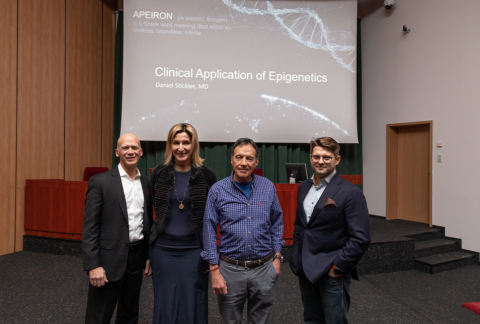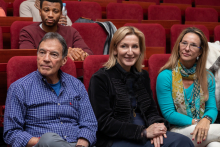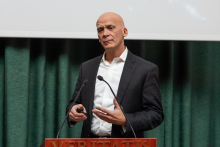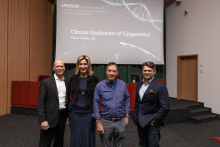The first speaker to take the floor was Dr. Daniel Stickler, Co-Founder and Chief Medical Officer of The Apeiron Center for Human Potential and Chief Science Officer for the Apeiron Academy. In his presentation, Dr. Stickler explained epigenetics based on the Dutch Famine that occurred at the end of WWII when Nazis punished the Netherlands by blocking food supplies for wanting to help the Allied forces. Research has shown that the children who were developing in their mothers’ womb during the famine were influenced by these external conditions. It turned out that their bodies remembered the environment they were exposed to in the womb and prepared for the worse. However, the food situation improved for the people of the Netherlands and when they became adults, they ended up a few pounds heavier than average and with higher rates of such conditions as obesity, diabetes and schizophrenia throughout their lives. In other words, “epigenetics can be used to describe anything other than DNA sequence that influences the development of an organism.” (https://en.wikipedia.org/wiki/Epigenetics). Epigenetics plays an important role at the Apeiron Center for Human Potential medicine because it addresses the whole person rather than an isolated set of symptoms - genetics, epigenetics, scientific and technologic advancements - to create a bio-individualized plan to help people reach new levels of human performance and potential. (https://www.apeironcenter.com/)
The second speaker was Dr. Mario Martinez, a U.S. clinical neuropsychologist who lectures worldwide on how cultural beliefs affect human health, longevity, and success. Dr. Martinez brought home for the students how important communication is in healthcare. The way a doctor communicates to a patient about their health condition can be the cause of, sometimes even death or, improved health. He gave many examples of how culture, belief systems and language influence people’s health. Dr. Martinez illustrated his point by referring to two different cultures and the language they use to describe menopause. In South America, the common word for menopause means “shame”. Needless to say, these women have an overall negative attitude toward the menopausal transition. Whereas in Japan, menopause is called a woman’s “second spring”. As can be expected, Japanese women live healthier, happier lives at menopause. Dr. Martinez gave many more fascinating examples from around the world which led to an interesting Q&A session following his presentation.
The full lecture was recorded and is made available on Dr. Daniel Sliz’s Facebook: https://www.facebook.com/daniel.sliz
Fot. Krzysztof Kurek
Department of Medical Photography MUW







